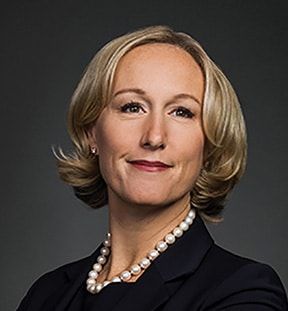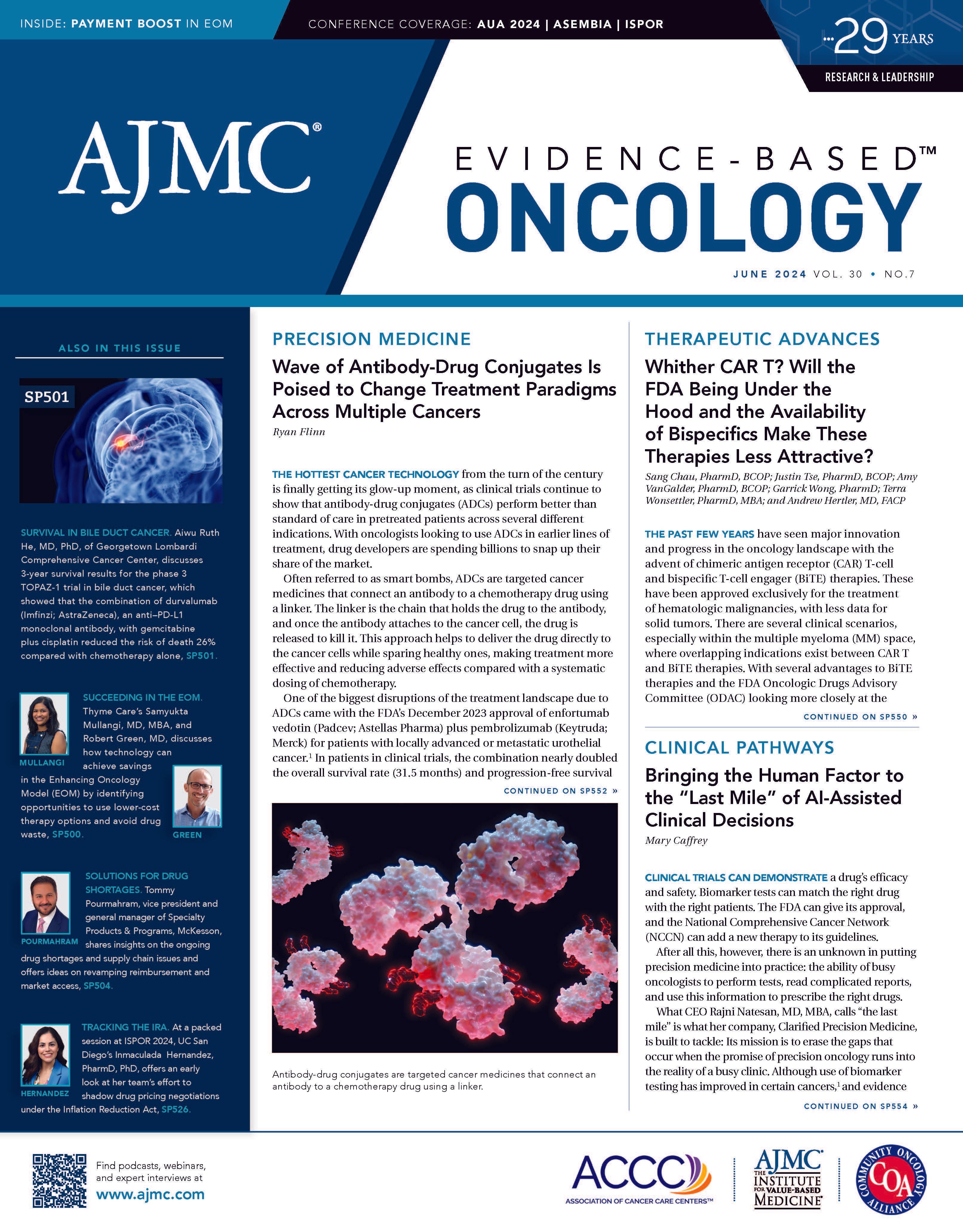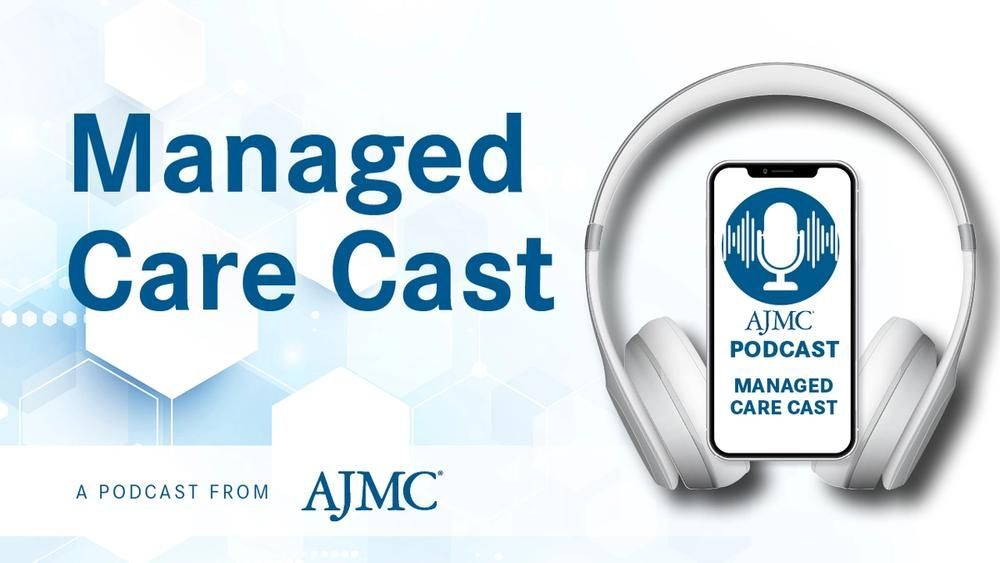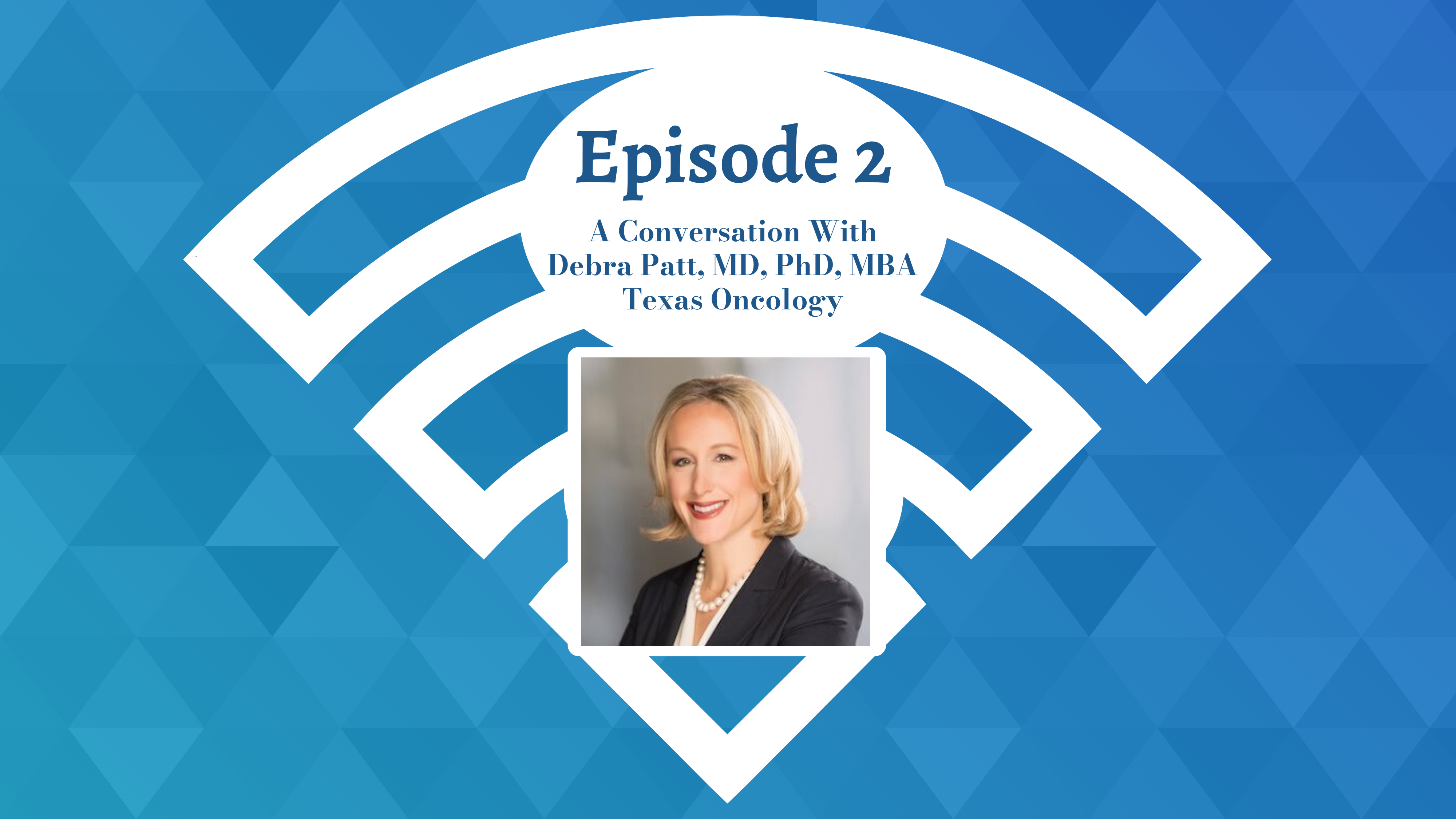Publication
Article
IVBM Austin: Value-Based Care in the Modern Era of Cancer Therapy
Author(s):
Coverage from the Institute for Value-Based Medicine.
In the era of modern cancer therapy, more patients are achieving either a cure or chronic disease control, which, in combination with value-based care initiatives, is driving a shift to care for the whole patient, explained Debra Patt, MD, PhD, executive vice president, Texas Oncology.
Debra Patt, MD, PhD, MBA | Image credit: Texas Oncology

Patt opened the May 8, 2024, Institute for Value-Based Medicine® (IVBM) event in Austin, Texas, cohosted by Texas Oncology and The American Journal of Managed Care® (AJMC®). The event featured 2 presentations from individuals representing practices in other states, as well as a panel discussion with 2 of Patt’s colleagues from Texas Oncology.
“I think we’ve seen so much transformation during the Oncology Care Model [OCM] that we’ve appreciated, and we hope to continue to see evolution of our care delivery systems through the Enhancing Oncology Model,” Patt said.
The OCM was Medicare’s original advanced alternative payment model for cancer care delivery and operated from 2016 through June 2022. The EOM succeeded the OCM and started July 1, 2023.
The hope in the early days of the OCM was that the model would drive robust participation in commercial payers with more contracts moving toward value-based care, she said. However, adoption by commercial payers has been both uneven and inconsistent throughout the US. Patt’s goal at the IVBM was to gain insights from other practices doing things differently from Texas Oncology in order to learn what works and what the challenges have been.
Kathryn Paliotta, RN, vice president of patient communications, New York Cancer & Blood Specialists (NYCBS), took the stage first to discuss how her practice navigates whole-patient care. She started her career with NYCBS as a triage nurse and was first told that they had 3 options when a patient called: (1) They educated the patient over the phone and managed their symptoms at home; (2) they brought the patient in for a same-day visit; or (3) they sent the patient to the emergency department (ED).
“I just remember thinking, ‘There is no way I’m going to be able to get a patient in same day with their oncologist for an urgent visit. These are specialists. They’re booked out 6 weeks,’” Paliotta told AJMC in an interview. “And I was just so impressed by how this practice functions and the culture of all the providers and everyone who participates in patient care that if our patients need to be seen, we get them in.”
The goal of NYCBS is to be a one-stop location for patients in the community. Historically, most patients with the practice traveled into the New York City metro area to receive quality oncology care, but that could be a 2- or 3-hour commute for patients on the east end of Long Island.
NYCBS originally started with hematology/oncology, which expanded to additional service lines to fulfill the needs of its patients. The brand now includes primary care, urology, nephrology, general surgery, rheumatology, and endocrinology, and even has imaging specialists.
Paliotta said she is very impressed with the imaging division. The interventional radiology suite grew out of a need to support patients because the local community hospital couldn’t handle the volume of patients, she explained.
An oncology diagnosis affects the body’s systems in every way, Paliotta explained, and chemotherapy has a cumulative impact on patients so that when they get sick, there’s a cascading effect. Having multiple lines of service within the brand means care teams not only keep care in-house but can also more easily keep tabs on patients to better treat them, she said.
A cancer diagnosis has many psychosocial components, and trying to figure out where to seek care can be stressful for patients. When patients get started on their treatment with NYCBS, they are told to call the practice any time they aren’t feeling well.
“So, they know they have that support,” Paliotta said. “They know which office they need to go to. They have a rapport with their providers. They’re not having to go seek care [by] going outside [the practice].”
NYCBS also prioritizes financial counseling; all new patients meet a counselor at the time of their new patient appointment to discuss the cost of treatment with insurance, the cost of living, and financial burdens they may experience. An oncology diagnosis is life-changing, and financial concerns are one barrier that could prevent a patient from seeking and continuing care, Paliotta explained. Patients are even offered transportation support through local rideshares to get them to appointments.
The financial counseling is part of a broader wellness program within NYBCS that started with psychology and evolved to include nutrition, case management, and social work. As a triage nurse, she often saw in the past that the practice could become a suicide hotline for patients who are struggling.
“I think being able to provide services to help get them through [their diagnosis and treatment] is important, because a lot of these patients feel like they have nowhere else to turn, and no one understands what they’re going through when they’re feeling really crummy, and they’re nauseous, and their daughter’s graduating college and they can’t make it because they’re so weak,” Paliotta told AJMC. “You know, that’s heavy, and they need someone to help them work through that and to be of support. So, I love that we have that available for our patients.”
Kiana Mehring, MBA | Image: Florida Cancer Specialists & Research Institute

Following Paliotta’s presentation, Kiana Mehring, MBA, senior director of strategic partnerships, managed care, Florida Cancer Specialists & Research Institute (FCS), discussed commercial payers and value-based contracts. FCS has been defining what value is and transitioning to a holistic model of care through innovative programs, she explained.
“FCS went through a complete shift over the last year to create a very sustainable model that is very patient centric,” Mehring told AJMC. “There were a lot of bespoke [payment models] in this space. And as OCM had sunsetted [and] in the rise of EOM, we just knew that we had to do things differently.”
Bespoke payment models are a “training nightmare,” she said, and they were difficult to manage. Instead, FCS wanted to have a design in place that was both sustainable and scalable.
In order to reimagine value-based care payment models, FCS went to its partners and asked them what they thought was important in value-based care. For the payers, cost savings came up more than anything else because oncology spend was unpredictable and out of control, Mehring said. Quality improvement was another common answer, with a need to improve survival rates, reduce complications, and decrease ED and inpatient utilization.
Patients highlighted that they wanted access to cutting-edge therapies and personalized medicine, but they also wanted more affordability with lower out-of-pocket costs and financial assistance programs.
Finally, self-funded health care, known administrative services only, wanted more predictable spending, reduced administrative costs, and better population management with data-driven insights.
To create a sustainable, patient-centered model aligned with payers and at-risk entities, FCS considered areas of opportunity to impact spend, a comprehensive cohort that ensures diversity of cases and encompasses all patients, collaborative care that fosters communication between primary care and oncology, and a forward-looking model that fosters a sustainable and high-value health care ecosystem.
The holistic model of care has been a culture shift, Mehring said. Initially, FCS was creating a program, but it became apparent that it was more than that. “It really has to be a way of doing things within our organization and a complete culture shift in order to be effective and sustainable,” she said.
In order to get commitment to the new way of working at FCS, everything was realigned around the holistic model of care with physician compensation revolving around a set of quality metrics. FCS went to its commercial payers to discuss the list of foundational elements for the holistic model of care and asked for their help to align commercial programs to the model.
In order to get commercial payers on board, FCS had to ensure it understood the payer needs, Mehring noted.
“We wanted to keep our organization aligned to the foundational elements of the holistic model of care, but we did tailor our proposals to the commercial payers based on their payer priorities,” she explained. “So, if there was an area that they felt was really important to them, we wanted to accommodate that as much as possible without getting to the bespoke models.”
In her interview with AJMC, Mehring emphasized that every organization needs to identify its own organizational elements to bring value to all stakeholders and be very honest about areas of opportunities. When FCS met with payers, it identified the areas where the practice could do better.
The evening closed out with a panel discussion centered on Texas Oncology’s experience with value-based care with Patt and her colleagues, Susan M. Escudier, MD, FACP, vice president, value-based care and quality programs; and Lance Ortega, MBA, BSN, RN, OCN, executive director, clinical services.
One of the topics of conversation was physician management during the practice’s transformation to value-based care. For instance, the panel mentioned that changing how the practice monitored and managed patients’ symptoms was “bumpy” because it meant switching platforms and changing the process to resolve issues in a timelier manner.
“Imagine if you’re a cancer patient and you’re taking a pill chronically to control your cancer, and that pill causes some kind of toxicity…. If you don’t get a call back within 50 minutes or right away, and that symptom worsens over time, you’re more likely to be admitted to the hospital,” Patt said. “You’re more likely to come off of therapy. You’re more likely to have a bad cancer journey.”
It takes hearing something 7 times before people really take in the information, noted Escudier, who admitted she often ignores something the first time she sees it but by the fourth time realizes it applies to her and she needs to follow it.
One shift that has taken place is the use of hospice and palliative care, which doctors once thought was the same as abandoning patients but now view as a part of good cancer care, Patt said. There is a reframing going on that hospice care is not giving up; it’s giving the patient what they need. However, there is training that is required for physicians to turn to palliative care.
“It’s just been such a shift in that thinking of, ‘How dare you suggest to my patient that they may not survive this critical illness’ to ‘Everyone needs access to this level of care,’” Escudier said. “And I think we’re not there yet. I’m hoping we get there.”
With unlimited resources, Ortega would focus more on dietitians and social workers and creating a true psycho-oncology model for more holistic cancer care. Cancer is one of the worst diagnoses a patient can get, and it comes with mental, emotional, and spiritual crises for patients that social workers can counsel them through. In addition, there is financial toxicity and the isolating effects that come with having cancer, he said.
“I won’t besmirch us and say we don’t do a good job—we do a fair job—but I think we can do better, and I think if we allocate more resources and [put] more focus on that, I think it’s going to be a better patient experience for everybody who comes to our door because that’s what they deserve,” Ortega said.






